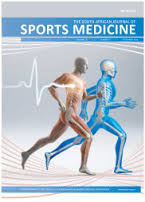Nutritional supplements use, cost, source of information, and practices by Johannesburg North gym goers
DOI:
https://doi.org/10.17159/2078-516X/2020/v32i1a6771Abstract
Background: Nutritional supplements are defined as any dietary supplement manufactured product that is generally intended to supplement the diet when taken by mouth as a pill, capsule, tablet, or liquid. Currently, the use of nutritional supplements is on the increase worldwide, predominantly in Western countries but also more recently expanding to other parts of the world for what has become a multibillion-dollar global industry. As a result, consumer demand has caused the increase in the advertising and marketing of these products. This contributes to early exposure to nutritional supplements by potential consumers and is an influencing factor for the use of performance-enhancing and/or appearance substances by adolescents. For the nutritional supplement industry the container is thus the manifestation of innovative ideas for the enterprising business-minded mogul. For the consumer, body image and ideal body discrepancy, and social influences manifest in the belief that the perfection of body development cannot be achieved without the use of nutritional supplements. This makes the consumer a captive audience for the industry and a challenge for the health care provider when suggesting alternatives to nutritional supplements, based on cost- benefit, and risk assessment.
Objective: To determine the association between commercial gym goers and nutritional supplements, in particular the commencement of use, reasons and purpose for use, and the financial and risk implications of use.
Methods: A self-administered questionnaire based on a cross-sectional quantitative design and systematic convenience sampling was given to the 364 recruited males and female gym goers.
Results: This study’s finding shows that the main reasons why females attend gyms are for muscle gain (57%), weight loss (48%), staying healthy (47%), and a ‘spiritual motive’ (39%) In males, it is predominantly for muscle gain (54%). Protein supplements were the most popular products that were consumed (84%) followed by carbohydrates (72%) and vitamins (71%). It was found that the consumption of nutritional supplements often starts at high school age and continues into adulthood. The analysis shows that natural source protein products are better priced than nutritional supplement products.
Conclusion: The study shows the importance of educating gym goers, the general public, and the guardians of minors to make a behaviour change towards nutritional supplement consumption. The change should also incorporate a cost-benefit risk assessment which is practical for the consumer when comparing supplement use as alternative sources of protein.
Keywords: alternative protein, body image, cost, gender, spiritual motives
Downloads
Downloads
Published
Issue
Section
License
The South African Journal of Sports Medicine reserves copyright of the material published. The work is licensed under a Creative Commons Attribution 4.0 (CC BY 4.0) International License. Material submitted for publication in the South African Journal of Sports Medicine is accepted provided it has not been published elsewhere. The South African Journal of Sports Medicine does not hold itself responsible for statements made by the authors.
How to Cite
- Abstract 1246
- PDF 989





.png)